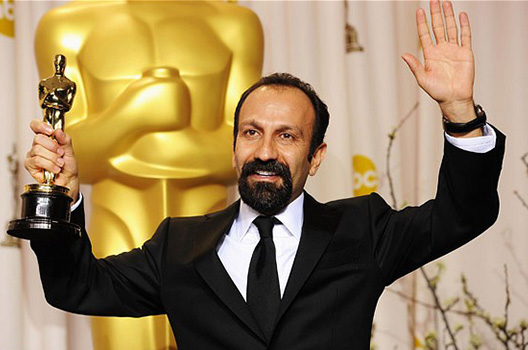 My movies are generally not happy ones. But I’m pleased that I make my people–or at least part of my people–happy with these awards,” said Iranian filmmaker Asghar Farhadi in his acceptance speech last weekend at the 2016 Cannes Film Festival.
My movies are generally not happy ones. But I’m pleased that I make my people–or at least part of my people–happy with these awards,” said Iranian filmmaker Asghar Farhadi in his acceptance speech last weekend at the 2016 Cannes Film Festival.
Farhadi, the 44 year-old Oscar-winning director, won the award for best screenplay at Cannes for his film The Salesman, a tale of mystery and suspense. A young Iranian couple, acting part-time in an adaptation of Arthur Miller’s play Death of a Salesman, are forced to change houses and face enigmatic events. A number of Western film critics have praised what they describe as Farhadi’s mastery of the family suspense genre in making this movie.
Shahab Hosseini, a 42-year-old Iranian actor who has received considerable acclaim for past roles, won the best actor award at Cannes for his performance in Farhadi’s film. This is Farhadi’s third film in which Hosseini has taken part. Hosseini also won a Golden Globe for his performance in Farhadi’s Oscar-winning movie A Separation.
In his acceptance speech, Hosseini saluted his father’s soul and said he owes the award to the people of his country, to whom it truly belongs.
Variety attributes this double-win for Iranian cinema to a post-nuclear deal resurgence in Iran’s cinematic domain, mentioning Farhadi’s return to Iran for work on The Salesman. After his 2011 Oscar win for A Separation, Farhadi made his next award-winning movie, The Past, in France. The critically acclaimed film was made abroad due to obstacles in the artistic sphere in Iran during the presidency of Mahmoud Ahmadinejad. Farhadi, who was residing in France, dropped his plans to film in Spain and commenced working on The Salesman, his seventh movie, in Iran last year, citing a preference to live and work in his own country despite potential problems and red lines.
These so-called red lines and limitations are still very much in place in Iran’s cinema. The Hassan Rouhani administration has had little success expanding freedom of the press or other civil rights. Like many Iranian film-makers, most Iranian journalists and activists continue to face grave constraints and drastic measures in case of minor oversteps of the boundaries and red lines, which at times are quite blurred.
The extent of these limitations, however, as well as the overall ambience in which screenwriters, directors, and actors work, has improved since Ahmadinejad’s era. The lowest point came with the closure of the House of Cinema, the largest and most-encompassing body for Iranian filmmakers, five years ago. When this association –comparable to the Screenwriters’ Guild in the United States– was forcibly shut down, a large group of respected Iranian directors and actors wrote a letter requesting its return to activity but was ignored by Ahmadinejad’s administration. The House of Cinema formally reopened after the 2013 election of Rouhani.
Among those who have returned to work since 2013 is Jafar Panahi, an internationally renowned, award-winning Iranian director, who was jailed amid the protests against the outcome of the 2009 presidential elections, in which Ahmadinejad won a fraud-tainted victory.
Panahi was released on bail after an international outcry and while technically still banned from filmmaking in Iran, has managed to direct three movies. They include a half-comedy, half-documentary film called Taxi last year, which starred himself as a former director-turned cab driver. Nasrin Sotoudeh, an internationally known lawyer and civil rights activist who has spent years behind bars, appears in the movie as well. Taxi was admired by film critics, and won the Golden Bear for Best Film at the 2015 Berlin International Film Festival. However, Panahi himself could not appear at the ceremony, since he is banned from foreign travel, and his niece received the award on his behalf.
While many critics anticipated the success of The Salesman in Cannes this year, Farhadi himself said the wide reception and lengthy applause that followed the screening of film surpassed his expectations.
Hosseini, a highly-talented actor who has become extremely popular in Iran this year following his performance in Shahrzad, a well-admired Iranian TV series, delivered an impressive performance in A Separation as well, though he did not play the main role in that movie. Hosseini received a Golden Globe award for this performance in 2012.
Iranian cinema has repeatedly produced internationally critically acclaimed films over the past three decades. Some successful Iranian filmmakers have even considered restrictions and restraints, while being frustrating, as the root of in-depth creativity and critical thinking, resulting in unique films.
A number of such films present unpleasant realities of Iranian society, for which their directors have been blamed by officials at times, to the point that their movies have been banned from screening inside the country under the pretext of being overly pessimistic or exaggerating and displaying the most negative aspects of the society. Overall, however, when creative Iranian filmmakers have focused on recounting tales which present universal emotions, they have managed to capture the hearts of many in Iran and beyond, including judges of highly respected Western film festivals.
